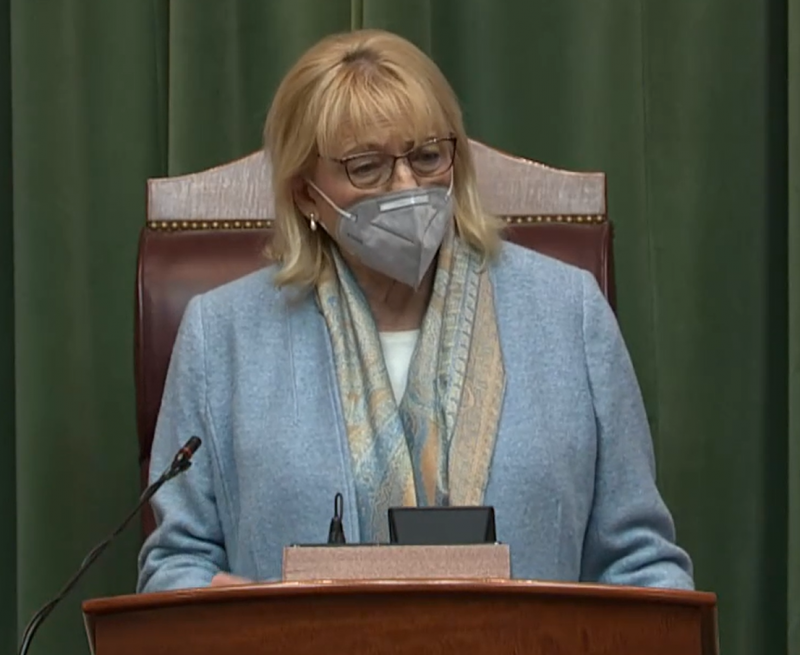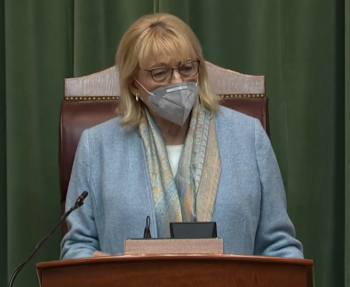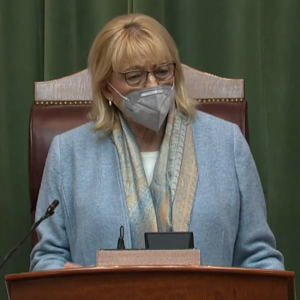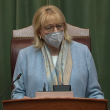Gov. Mills pledges free college, relief checks, student debt relief, internet accessibility
AUGUSTA — In her second State of the State address, Governor Janet Mills declared Thursday night that “Our state is strong, and it is growing stronger every day,” as she touted the significant progress Maine has made despite the ongoing COVID-19 pandemic and as she vowed to continue progress on behalf of Maine people.
“Maine people deserve every ounce of hard-won progress that we have achieved despite the pandemic. More than this, Maine people have earned the progress that is yet to come,” Governor Mills said. “Our state is beautiful. Our state is strong, and it is growing stronger every day…Tonight, we recommit to progress, to recovery, to moving forward towards normalcy… That is my mission, and I ask you all to join me. Because progress is why Maine people sent us here, and after these past twenty-three months, I have never believed more in the people of our great state.”
Maine has the third highest vaccination rate in the nation and the fourth lowest death rate in the nation, despite having one of the oldest populations in the nation. Despite that success, Governor Mills recognized the continued impact of the pandemic and pledged that her Administration would continue to support the people of Maine.
“Last year’s emergency measures no longer serve the purposes they once did, nor should they. As science and trends evolve, our response evolves as well. Today, we focus not on telling people what they cannot do. We focus on telling people what they can and should do. We focus on preserving the most vital facets of our lives: our schools, our hospitals, our jobs,” said Governor Mills. “As the storm of the pandemic endures, with peaks and valleys to come, my pledge to you is this: that we will work day and night to make vaccines and tests accessible to all; to keep our children safe in their schools; to work in close partnership with our health care systems, ensuring critical care for all those who need it, and not just those with COVID; and to keep our businesses open and thriving and our economy moving forward.”
The Governor also noted Maine’s Gross Domestic Product, a key measure of economic growth, grew at the second fastest rate in New England and the 14th fastest rate in the nation through the third quarter of last year; that Maine’s population grew at the second highest rate in New England and seventh highest rate in the nation; that Maine has a budget surplus of $822 million and that Maine’s Rainy Day Fund has more than doubled under her tenure to a record high of nearly $500 million.
However, the Governor also acknowledged the challenges remaining on Maine’s road to recovery, identifying the longstanding workforce shortage as the biggest problem facing Maine after the pandemic and the toll inflation is taking on the pockets of Maine people.
To help Maine people grapple with the increased costs of everyday goods, Governor Mills announced she will return half the surplus – $411 million – to the people of Maine, consistent with the calls of Senate and House Republican lawmakers.
“I cannot control the impact of COVID-19 on global markets, but I can make sure that we deliver to Maine people the resources they need to grapple with these rising costs as we rebuild a stronger sustainable economy that is more resilient to the whims of the rest of the world,” said Governor Mills. “I propose that we send half of this projected surplus – $411 million – back to the people of Maine with a direct check. These givebacks will amount to about $500 per person and will be distributed to an estimated 800,000 taxpayers in Maine to help them offset added costs.”
The Governor also underscored the importance of her Maine Jobs & Recovery Plan to tackling the workforce shortage, outlining its crucial investments in the human infrastructure that experts have said Maine people need to succeed, including child care, housing, high-speed internet, health care, and world-class educational opportunities from Pre-K through college.
“Our workforce shortage is a serious problem. It is a problem I inherited, but it is not one that I will leave to our grandchildren to solve,” said Governor Mills. “It will take hard work, not simplistic solutions – but we know what we need to do. Maine people are telling us that they need child care, that they need housing, and that they need broadband, that they need good health care, and strong public schools for their kids. I agree. This is why we have adopted a comprehensive approach through the Maine Jobs and Recovery Plan, and why we welcome a bipartisan effort to improve our schools and make every child ready for a career and a meaningful life in the state we hope they will always call home.”
To support students who were most impacted by the pandemic and to make sure they can enter the workforce with a good-paying job, Governor Mills announced that she will make two years of community college free for Maine students.
“For the young people of Maine whose aspirations were most impacted by the pandemic, I propose making two years of community college free. To the high school classes of 2020 through 2023 – if you enroll full-time in a Maine community college this fall or next, the State of Maine will cover every last dollar of your tuition for you to obtain a one-year certificate or two-year associates degree, so that you will graduate unburdened by debt and ready to enter the workforce. And if you are someone who’s already started a two-year program, we’ve got your back too,” said Governor Mills. “We’ll cover the last dollar of your second year. There are so many good-paying jobs in health care, engineering, the trades, construction, in clean technology, and many other industries that are just waiting for you. As your Governor, I want you to know that the future is yours, and that we will help you embrace it.”
Governor Mills also proposed funding to transform the Opportunity Maine Tax Credit into a nation-leading debt relief tool to attract college graduates to live in Maine, consistent with the goals of legislation sponsored by Senator Matt Pouliot (R-Kennebec):
“School debt is a heavy burden that prevents young people from starting a business, affording a mortgage or paying their bills and achieving their full potential. It is simply unacceptable,” said Governor Mills. “We will broaden and simplify the [Maine Opportunity Tax Credit’s] eligibility criteria so that those who graduated with student debt – regardless of what type of degree they have or where they graduated or what type of work they do now – they will be eligible for up to $25,000 of debt relief over the course of their lifetime, so long as they have a job and they make Maine their home. With these changes, the Opportunity Maine Tax Credit will be the leading student loan debt relief program in the nation and a powerful tool for employers to draw people from all walks of life to work and live in the State of Maine.”
Governor Mills also announced several initiatives to support children’s growth and path into the workforce and to strengthen Maine’s economy, including:
Increasing Pay for Child Care Workers and Early Childhood Educators: Governor Mills proposed investing more than $12 million to increase pay for child care workers and early childhood educators to strengthen our child care system across Maine, consistent with the goals of legislation sponsored by House Speaker Ryan Fecteau.
Investing in K-12 Education: Governor Mills pledged to create an Education Stabilization Fund, capitalized with $30 million from the General Fund, to maintain the state’s commitment – achieved for the first time ever under her administration – to fund public schools at 55 percent.
Fully Funding Free Meals: Governor Mills proposed to fully fund universal free meals in public schools, consistent with an initiative spearheaded by Senate President Troy Jackson.
Experiential Learning: Governor Mills directed Education Commissioner Pender Makin to design a program of experiential learning to reconnect Maine’s children to the classroom and to get them outdoors, exposing them to new experiences and enhancing their educational opportunities.
Achieving Internet Connection for All Who Want It By 2024: Governor Mills pledged that every person in Maine who wants to connect to high-speed internet will be able to by 2024 – just two years from now.
Supporting Maine Hospitals and Nursing Homes: Governor Mills proposed sending another $50 million to Maine hospitals and nursing homes, $25 million each, to help them confront the continued impacts of the pandemic.
Convening a Silver Cabinet: Governor Mills committed to convening a Silver Cabinet to mobilize State government, eliminate silos and enhance communication and coordination to ensure that every person in Maine may age safely, affordably, in a way that best serves their needs.

























